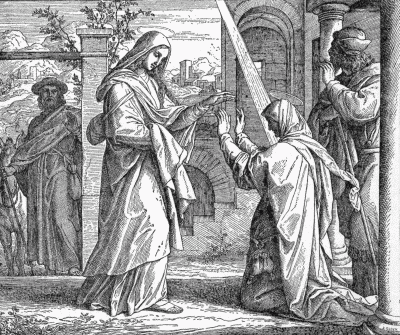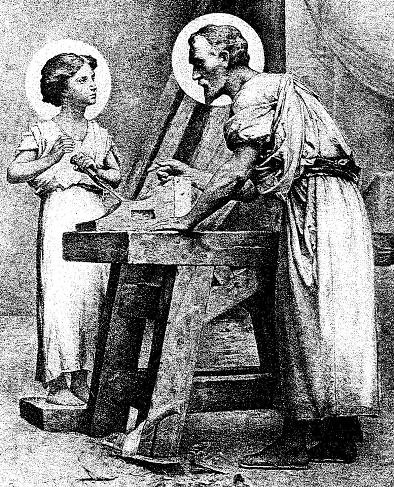at yesterday's General Audience in St. Peter's Square:

"Even if a few days have already passed since my return, I would like to dedicate the catechesis of today, as I normally do, to the apostolic trip that I made to the United Nations and the United States of America this past April 15 to 21.
"Before all, I renew my most cordial appreciation to the U.S. episcopal conference, as well as President Bush, for having invited me and for the warm welcome they have given me. And I would like to extend my thanks to all those in Washington and New York who came to greet me and manifest their love for the Pope, or who have accompanied and supported me with prayer and with the offering of their sacrifices.
"As we know, the occasion of my trip was the bicentennial of the elevation of the country’s first diocese, Baltimore, to a metropolitan see, and the foundation of the sees of New York, Boston, Philadelphia and Louisville.
"On this characteristically ecclesial anniversary, I have had the joy of personally visiting, for the first time as the Successor of Peter, the dear people of the United States of America, to confirm the Catholics in their faith, to renew and increase fraternity with all Christians, and to announce to everyone the message of 'Christ Our Hope,' as the theme of the trip said.

"In the meeting with the president, in his residence, I was able to pay homage to this great country, which from the beginning has been constructed based on a pleasing joining together of religious, ethical and political principles, and continues to be a valid example of healthy secularism, where the religious dimension, in the diversity of its expressions, is not only tolerated but valued as the 'soul' of the nation and the fundamental guarantee of the rights and duties of the human being.
"In this context, the Church can carry out its mission of evangelization and human promotion with freedom and commitment and, at the same time, can be a stimulus for a country such as the United States, to which everyone looks as one of the principal agents on the international scene, so that it is oriented toward global solidarity, ever more necessary and urgent, and toward the patient exercise of dialogue in international relations.
"Naturally, the mission and the role of the ecclesial community were at the center of the meeting with the bishops that took place in the National Shrine of the Immaculate Conception, in Washington.

"In the liturgical context of vespers, we praised the Lord for the path traveled by the people of God in the United States, for the zeal of its pastors, and for the fervor and the generosity of its faithful, which is manifested with a high esteem and openness to the faith, and in innumerable charitable and humanitarian initiatives within the country and outside it.
"At the same time, I was able to support my brothers in the episcopate in their difficult task of sowing the Gospel in a society marked by many contradictions, which threaten the coherence of the faithful and of the clergy themselves.
"I encouraged them to raise their voices on current moral and social questions and to form the lay faithful so that they be good 'leaven' in the civil community, starting from the fundamental cell that is the family.
"In this sense, I exhorted them to re-propose the sacrament of matrimony as a gift and indissoluble commitment between a man and a woman, the natural environment for the welcoming and education of children.
"The Church and the family, together with schools, especially those of Christian inspiration, should cooperate to offer youth a solid moral education, but in this task the agents of communication and entertainment also have a great responsibility.

"Thinking of the sorrowful situation of the sexual abuse of minors committed by ordained ministers, I wanted to express to the bishops my closeness, encouraging them in the commitment to heal the wounds and to reinforce their relationships with their priests.
"Responding to some questions asked by the bishops, I highlighted a few important aspects: the intrinsic relationship between the Gospel and 'natural law'; the healthy concept of freedom, which is understood and fulfilled in love; the ecclesial dimension of the Christian experience; the demand to announce in new ways, especially to youth, “salvation” as the plenitude of life, and to educate them in prayer, from which sprouts the generous response to the call of the Lord.
"In the great and festive Eucharistic celebration in Nationals Park stadium in Washington, we invoked the Holy Spirit upon the Church in the United States of America, so that firmly rooted in the faith transmitted by its fathers, profoundly united and renewed, it will face present and future challenges with courage and hope — that hope that
'does not disappoint, because the love of God has been poured out into our hearts through the Holy Spirit that has been given to us' (
Romans 5:5).
"One of these challenges is certainly that of education, and for this reason, in the Catholic University of America, I met with rectors of universities and Catholic educational centers, with the diocesan leaders responsible for teaching, and with representatives of professors and students.

"The educational task is an integral part of the mission of the Church, and the U.S. Church community has always been very committed in this field, offering at the same time a great social and cultural service to the entire country.
"It is important that this can continue.
"And it is in the same way important to take care of the quality of the Catholic centers of education so that in them, [students] are formed truly according to 'the extent of the full stature of Christ' (
cf. Ephesians 4:13), joining together faith and reason, truth and liberty. With joy, therefore, I have confirmed the formators in their precious commitment to intellectual charity.

"In a country like the United States of America, with a multicultural vocation, the meetings with representatives of other religions have taken on special importance: in Washington, in the John Paul II Cultural Center, with Jews, Muslims, Hindus, Buddhists and Jains; in New York, the visit to the synagogue.
"Moments, especially this latter one, which were very cordial, which have confirmed the common commitment to dialogue and the promotion of peace and spiritual and moral values.
"In [a country] that can consider itself the homeland of religious liberty, I wanted to recall that this should always be defended with a joint effort, so as to avoid any kind of discrimination or prejudice.
"And I stressed the great responsibility of the religious representatives, both in teaching respect and nonviolence, and in nourishing the deepest questions of human consciousness.

"The ecumenical celebration, in the parish church of St. Joseph, was also characterized by great cordiality.
"Together, we asked the Lord that he increase in Christians the capacity of giving reasons, also with an ever greater unity, for their unique hope (
cf. 1 Peter 3:15) based in a common faith in Jesus Christ.
"The other principal objective of my trip was the visit to the central offices of the United Nations Organization: the fourth visit of a Pope, after that of Paul VI in 1965 and the two visits of John Paul II, in 1979 and 1995.

"In the celebration of the 60th anniversary of the Universal Declaration of Human Rights, Providence permitted me to confirm, in the most great and authoritative supranational assembly, the value of this declaration, recalling its universal basis, that is, the dignity of the human person created by God in his image and likeness to cooperate in the world with his great design of life and peace.
"Respect for human rights is rooted, as well as in peace, in 'justice,' that is, in an ethical order valid in all times and for all peoples, which can be summarized in the famous maxim: 'Do not do unto others what you would not have them do unto you,' or, expressed positively in the
words of Jesus,
'Do unto others what you would have them do unto you' (Matthew 7:12).
"Upon this base, which constitutes the characteristic contribution of the Holy See to the United Nations Organization, I renewed and I renew again today, the commitment of the Catholic Church in contributing to strengthen international relations, characterized by the principles of responsibility and solidarity.
"Other moments of my stay in New York have remained firmly etched in my spirit.
"In St. Patrick’s Cathedral, in the heart of Manhattan, truly a
'house of prayer for all peoples,' I celebrated holy Mass for the priests and consecrated persons who had come from all parts of the country.

"I will never forget the warmth with which they congratulated me for the third anniversary of my election to the See of Peter.
"It was a moving moment, in which I experienced in a tangible way all of the support of the Church for my ministry.
"I could say the same about my meeting with youth and seminarians, which was held precisely in the diocesan seminary, preceded by a very significant meeting with handicapped boys and girls and their families.

"I proposed to youth — who by their nature are thirsting for truth and love — some figures of men and women who have given an exemplary testimony of the Gospel in the lands of the United States, the Gospel of the truth that frees in love, in service, in life given for others.


"In seeing the darkness that today threatens their lives, youth can find in the saints the light that dissipates it: the light of Christ, hope for all men.
"This hope, stronger than sin and death, motivated the emotion-swelled moment that I spent in silence at the crater of ground zero where I lit a candle, praying for all the victims of that terrible tragedy.
"Finally, my visit culminated with the celebration of the Eucharist in Yankee Stadium in New York: I still carry in my heart that festival of faith and brotherhood, with which we celebrated the 200 years of the oldest dioceses of North America.
"The original little flock has progressed enormously, enriching itself with the faith and the traditions of successive waves of immigration.

"To this Church, which now faces the challenges of the present, I have had the joy of announcing anew 'Christ Our Hope' of yesterday, today and forever.
"Dear brothers and sisters, I invite you to unite yourselves with me in thanksgiving for the encouraging results of this apostolic trip and in the supplication to God, through the intercession of the Virgin Mary, that it produces abundant fruits for the Church in the United States and in all parts of the world."
 A Penitent Blogger
A Penitent Blogger



















 "The truth that by means of work man participates in the activity of God himself, his Creator, was given particular prominence by Jesus Christ - the Jesus at whom many of his first listeners in Nazareth 'were astonished, saying, "Where did this man get all this? What is the wisdom given to him?.. Is not this the carpenter?"'
"The truth that by means of work man participates in the activity of God himself, his Creator, was given particular prominence by Jesus Christ - the Jesus at whom many of his first listeners in Nazareth 'were astonished, saying, "Where did this man get all this? What is the wisdom given to him?.. Is not this the carpenter?"'